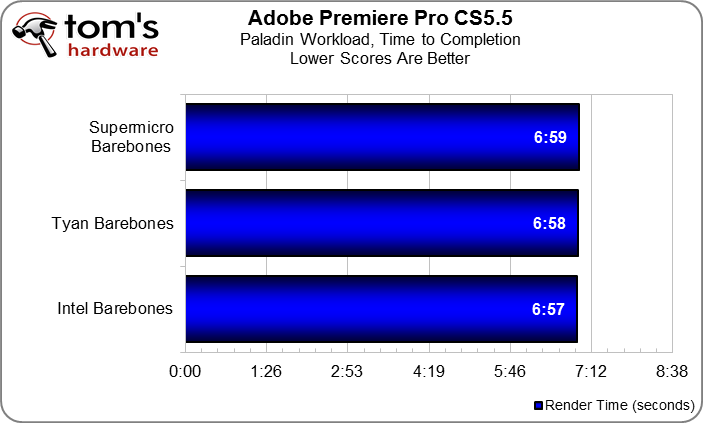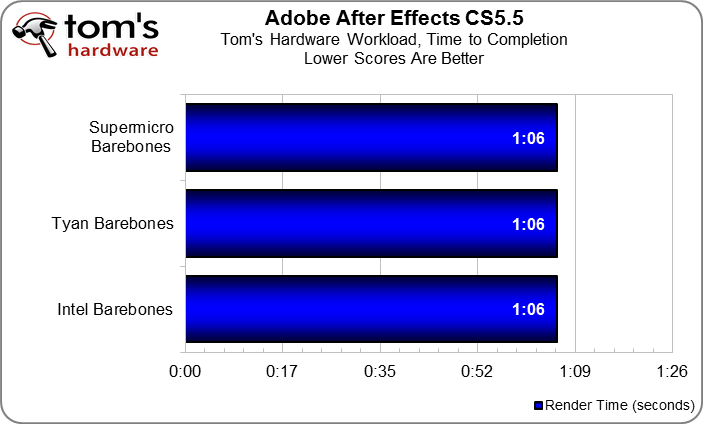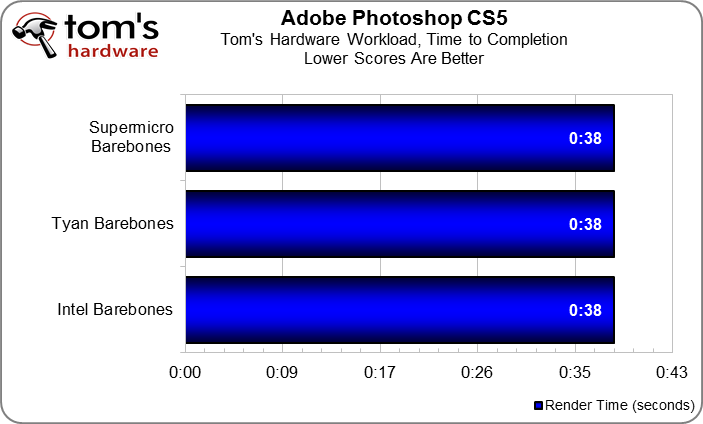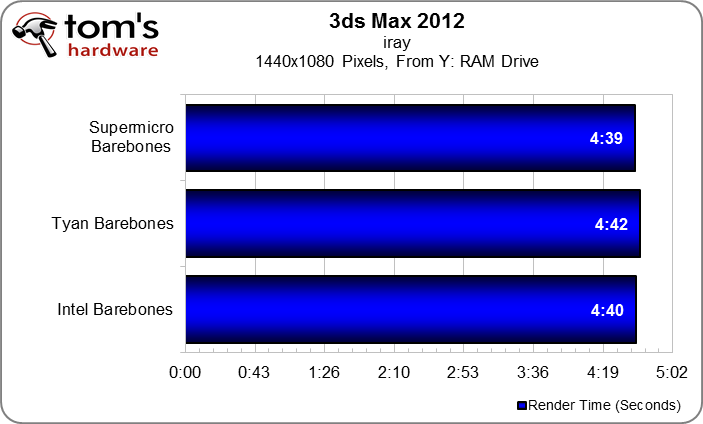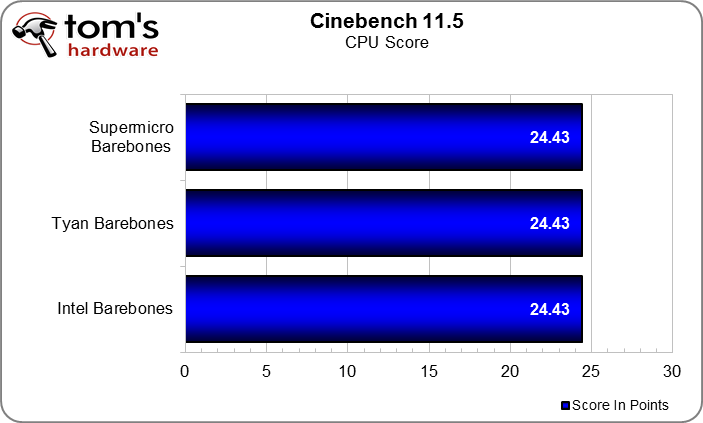Three Xeon E5 Server Systems From Intel, Tyan, And Supermicro
After taking a first look at Intel's Xeon E5 processors, we wanted to round up a handful of dual-socket barebones platforms to see which vendor sells the best match for Sandy Bridge-EP-based chips. Intel, Supermicro, and Tyan are here to represent.
Benchmark Results: Adobe CS 5, 3ds Max, And Cinebench
Each of our three samples employs Intel's Patsburg chipset with two Intel Xeon E5-2690 CPUs and the same memory. Overclocking is not supported, aside from the dynamic frequency adjustments attributable to Turbo Boost technology. What we're looking for, then, are dips in performance that could be caused by throttling as a result of getting too hot, or Turbo Boost not spinning up as high on one platform as the others. All of these systems are designed to run at full speed 24x7.
The trio is tied in Adobe's Premiere Pro.
After Effects similarly finishes very close. Whereas Premiere is a well-threaded metric, this test tends to not favor clock rate more. The fact that the results come close again suggests we're seeing similar impact from Turbo Boost.
Adobe Photoshop CS 5 is still very popular. But with Photoshop CS 6's recent launch, Adobe did introduce certain performance enhancements. Still, we can see that identical processors and memory yield very similar performance.
3ds Max 2012 is a popular 3D modeling program used by many professionals. Once again, we see no evidence of thermal throttling.
Cinebench 11.5 demonstrates impressive performance, more than tripling what the just-launched Xeon E3-1200 V2 series can do. Again, though, there is very little differentiation between platforms.
Get Tom's Hardware's best news and in-depth reviews, straight to your inbox.
Current page: Benchmark Results: Adobe CS 5, 3ds Max, And Cinebench
Prev Page Pricing, Warranty, And Support Comparison Next Page Benchmark Results: Compiling, Folding, And Euler-
EzioAs Reply9532821 said:the charts are looking strange. they need to be reduced in size a bit....
I agree. Just reduce it a little bit but don't make it too hard to see -
willard TheBigTrollno comparison needed. intel usually winsUsually? The E5s absolutely crush AMD's best offerings. AMD's top of the line server chips are about equal in performance to Intel's last generation of chips, which are now more than two years old. It's even more lopsided than Sandy Bridge vs. Bulldozer.Reply -
Malovane dogman_1234Cool. Now, can we compare these to Opteron systems?Reply
As an AMD fan, I wish we could. But while Magny-Cours was competitive with the last gen Xeons, AMD doesn't really have anything that stacks up against the E5. In pretty much every workload, E5 dominates the 62xx or the 61xx series by 30-50%. The E5 is even price competitive at this point.
We'll just have to see how Piledriver does.
-
jaquith Hmm...in comparison my vote is the Dell PowerEdge R720 http://www.dell.com/us/business/p/poweredge-r720/pd?oc=bectj3&model_id=poweredge-r720 it's better across the board i.e. no comparison. None of this 'testing' is applicable to these servers.Reply -
lilcinw Finally we have some F@H benches!! Thank you!Reply
Having said that I would suggest you include expected PPD for the given TPF since that is what folders look at when deciding on hardware. Or you could just devote 48 hours from each machine to generate actual results for F@H and donate those points to your F@H team (yes Tom's has a team and visibility is our biggest problem). -
dogman_1234 lilcinwFinally we have some F@H benches!! Thank you!Having said that I would suggest you include expected PPD for the given TPF since that is what folders look at when deciding on hardware. Or you could just devote 48 hours from each machine to generate actual results for F@H and donate those points to your F@H team (yes Tom's has a team and visibility is our biggest problem).The issue is that other tech sites promote their teams. We do not have a promotive site. Even while mentioning F@H, some people do not agree with it or will never want to participate. It is a mentality. However, it is a choice!Reply
